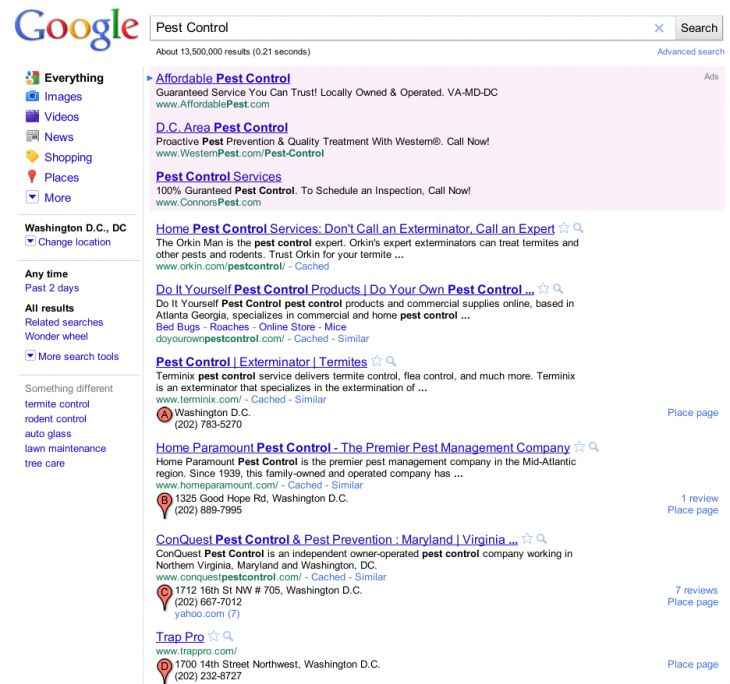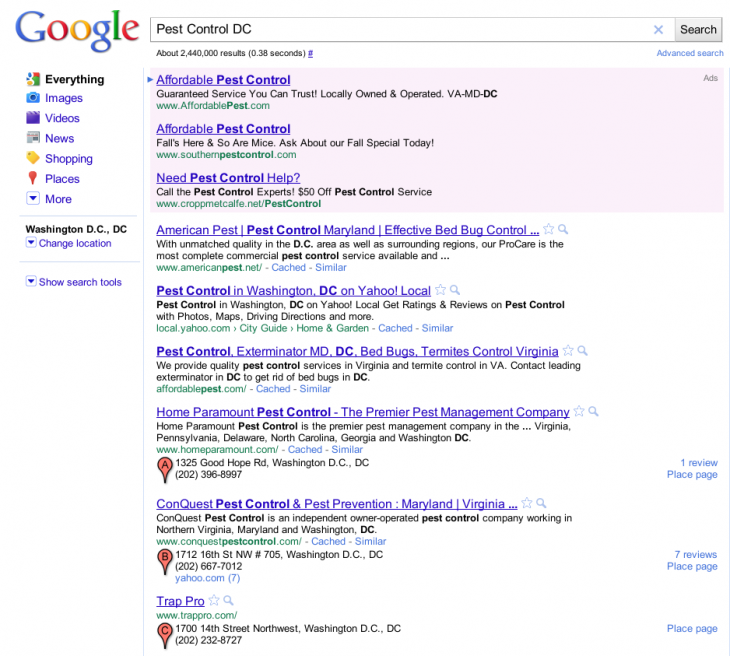Many small businesses across the country begin their SEO campaigns with dreams of being able to quickly rank for their market’s key phrases. Unfortunately, ranking on the front page of Google for phrases like “Jobs” or “Pest Control” means that you’re often competing with major brands or franchises who spend hundreds of thousands of dollars each year on marketing efforts, including SEO. Small businesses often look at this challenge and decide to compete for more local keywords such as “Dallas Jobs” or “Virginia Pest Control“.
Local vs. General
General Keywords are essentially the market keywords. Often one to two words about any particular topic or industry make up a general keyword. These keywords do not include specific location modifiers. An example would be the keyword “Pest Control”.
Local keywords are often the market keyword plus a location. For example, if I was hoping to rank in the search engines for Pest Control assistance in Washington DC, I’d focus my efforts on ranking for terms like “Pest Control DC”, “Pest Control Washington D.C”., and “Washington D.C. Pest Control”.
People are more likely to enter General Keywords into the search bar when looking for any particular service or idea.
Related Content:
The numbers in the table above demonstrate the true value of ranking for a general keyword. However, for many small businesses, of the general searches are not very important to rank highly for. For example, if you’re providing Pest Control services in Washington DC, you are not interested in individuals in Miami Florida searching “Pest Control”. You’re only interested in people in the DC area that search for “Pest Control”. Thankfully, there is a way for these businesses to quickly receive the benefits of ranking for general keywords when it matters most, which is when they’re searched for by people in your area.
Combining Location and General Keywords
Google and many other search engines understand the exact situation described above and have provided us a solution. When a user searches a general term that has local relevance, Google will provide back results that include the best sites for that term, and they will include the best sites in the users local area mixed into the results.
Lets compare the two screen shots below.
Search: Pest Control
Search: Pest Control DC
The first screenshot shows the results of a general search of “Pest Control” by a user in the Washington DC area. The results include a number of Pest Control industry leaders websites, but as you move down through the results you’ll start to notice that they include location based results. The top 10 includes results of small businesses and local area competitors for the general search term. This means that a local mom and pop shop can rank for the general search term for even very competitive General Keywords, which could be a huge driver of new business.
If we look at the second screenshot you’ll see that many of those local listings included in the ‘general keyword search’ are top ranking in the local keyword search. This further proves our point, that if you have strong local SEO, you stand a good chance of showing up for the general keywords when a user in your local area searches the term.
Conclusion
You may ask what this all means? Essentially, if you’re able to rank highly for local searches for your target keywords like “Raleigh Pest Control“, you should expect to show up in the results of individuals in your area that search the general keyword “Pest Control”. For many industries, focusing efforts on Local SEO will allow you to compete for the general keywords when they matter most, which is when people close to your business are searching for your services.
Search News Straight To Your Inbox
*Required
Join thousands of marketers to get the best search news in under 5 minutes. Get resources, tips and more with The Splash newsletter:

